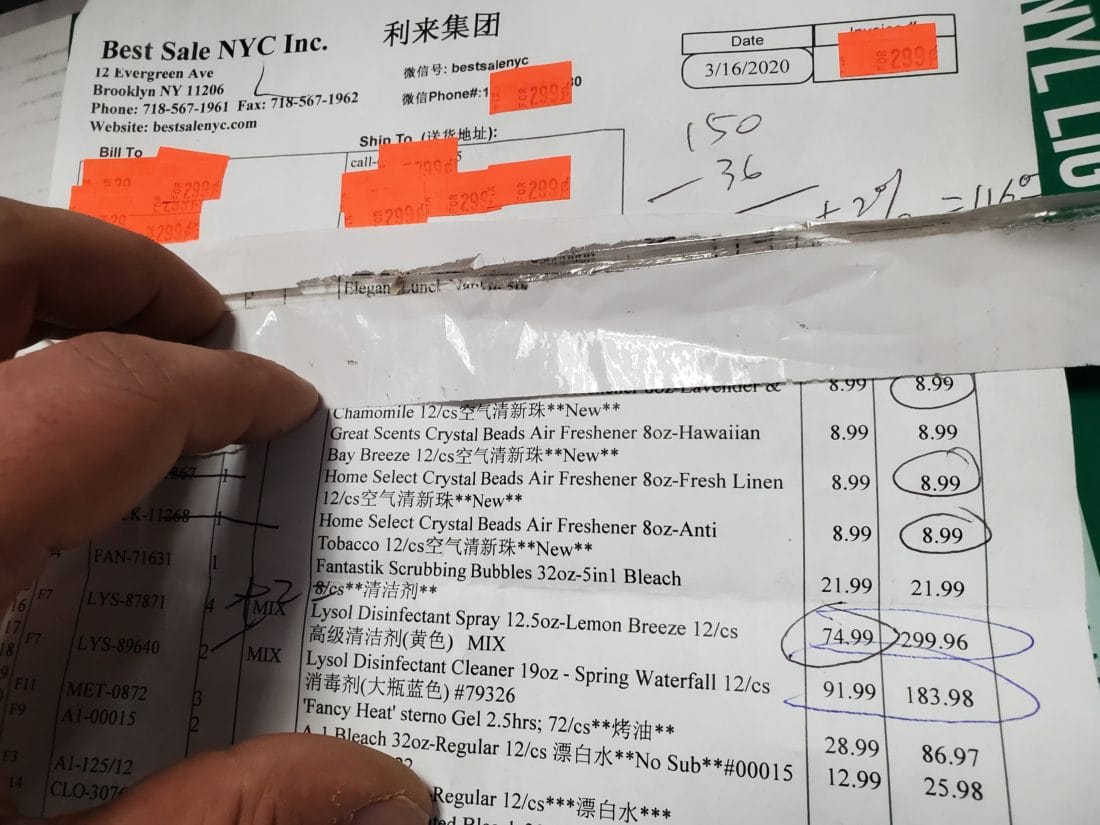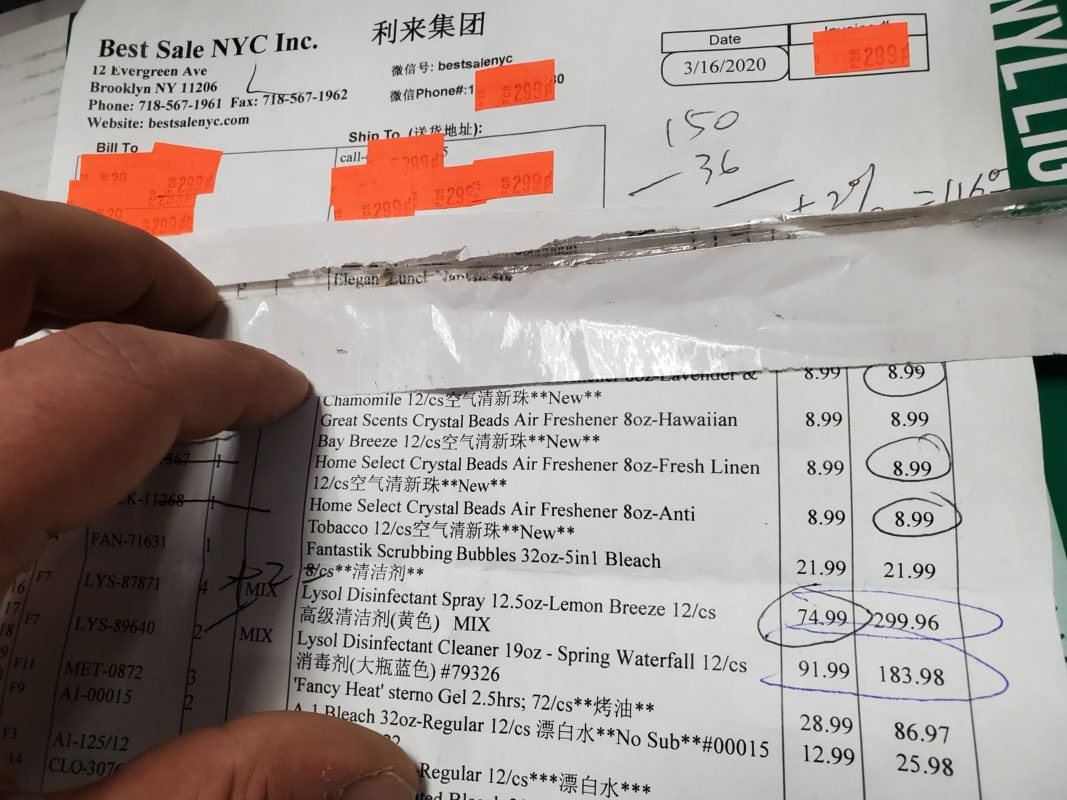Our Government Can And Must End Wholesale Price Gouging. (Opinion)


Lysol has been a go-to product to fight epidemics since the 1880’s. It was used to fight cholera in Germany in 1889 and the Spanish Flu in Spain in1918. Today it is one of the products that are in high demand by consumers who want to disinfect their homes to prevent the spread of the COVID-19 virus. In NYC, and especially in North and East Brooklyn, Lysol Disinfectant spray is one of the golden eggs for price gougers; the others are Purell Hand sanitizer and Clorox Disinfectant wipes. In Brooklyn stores, the prices of these three disinfectant products have skyrocketed.
While the EPA publishes a list with dozens of products that are “recommended” for killing the COVID-19 virus, these are the products of choice for Brooklyn consumers because of their ease of use and strong brand-name appeal. Knowing this, price gougers who supply hundreds of Dollar stores (99 cents stores) across Brooklyn have been unrelentingly gouging away. The wholesalers are to blame. They have hundreds of Dollar stores clients and control many of the stores directly. The scenario that the wholesale price gouging has created should scare us.
The Dollar stores are managed by mostly immigrant employees. These retailers are the front people for the real owners. They select and purchase the merchandise for the stores they manage. Their response to the price gouging of Lysol spray, Purell Hand sanitizer, and Clorox wipes was to not buy these products anymore or to buy them in much smaller quantities than normal.
The few managers who did restock these three disinfectant products had to raise prices to compensate and have faced anger and indignation from their longtime customers who in some cases have filed or threatened to file price gouging complaints against the store with “311.” As days passed and NYC became more intensely impacted by the COVID-19 virus, the wholesalers continued to raise the price of disinfectants, at times raising the price several times in the same day! The price gouging became so extreme that the few store managers who persisted in keeping it on their shelves stopped buying it, too.
Suddenly, disinfectants have completely disappeared from hundreds of Brooklyn stores. Consumers could not buy them anywhere at any price. To them, it appeared that disinfectants were simply sold out. In fact, boxes of them were sitting inside the warehouses of only a few blocks away where the wholesalers were hoarding in anticipation of higher prices. Mimicking the economics of oil industry cartels, disinfectants were plentiful but not reaching consumers until the immigrant store managers paid up. But they wouldn’t because their retail customers were pushing back forcefully. When City Hall began to fine the merchants instead of the suppliers, they likewise feared being scapegoated.
After my campaign began to work with these merchants to expose these price gouging suppliers, the suppliers began to rapidly unload all of the disinfectants that were in their warehouses.
They also stopped restocking these disinfectants and began to go into hiding by shutting down their warehouses and shifting to ‘telephone orders’ only. No more reselling Lysol, Hand sanitizers, or Clorox wipes for them. They want to avoid the unwanted attention that the price gouging has brought to them.
The result is that the entire market for disinfectants has stopped. Hundreds of Dollar stores cannot restock disinfectants. The managers are dependent on these suppliers, not just for disinfectants but for all of their products. Most of the Dollar store managers have no contact with other distributors or resellers, or they fear stepping out of the narrow supply chain that sustains their overall business, so they have made no effort to find other channels to restock disinfectants.
The result is that tens of thousands of consumers across North and East Brooklyn have no access to the product they most want to use to prevent the spread of the most dangerous virus of their lifetimes. A virus that is not fatal to most, but that spreads rapidly, and the more it spreads, the more people die. Disinfectants would help prevent its spread in people’s homes if they were available for purchase.
I spoke to a representative of the company that makes Lysol, Reckitt Benckiser, who told me, “We have not raised our prices. We are working with our retail partners to curtail independent third-party resellers from taking advantage of consumers by reselling at excessive prices. Our goal is to maximize access to our products.”
In my opinion, there is a serious and urgent supply chain problem. It falls to the NYC Department of Consumer Affairs (DCA) to fix immediately. Placing the burden on consumers to file complaints and issuing fines to storefront merchants is insufficient and misses the actual target. It has not stopped the price gouging and it has not unblocked the supply chain for disinfectants that kill the COVID-19 virus. The NYC DCA should intervene in the market for disinfectant products and ensure that “independent third party resellers” are not exploiting the COVID-19 crisis to gain extreme profits.
This is the root of the price gouging problem, and it is placing tens of thousands of lives at risk. I went to storefront merchants and got commitments from them to not price gouge in CD37, the DCA could be doing the same thing with large wholesalers and distributors: getting commitments, preventing them from price gouging. Sadly, the DCA is doing nothing.
In an effort to have disinfectant products reflow unimpeded to store shelves in the district that I am campaigning to represent in the City Council, I have personally contacted manufacturers of several EPA recommended virus killing products including Lysol and Clorox manufacturers. They have all committed to help NYC and to help get their products to our local markets and bypass the price gouging resellers.
I have asked them all the same question. Has anyone from NYC government called you? The answer to that question has been the same in every case: No!




